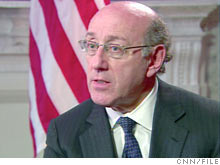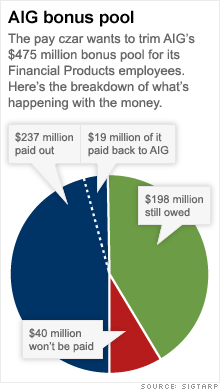3 AIG execs get bonus OK from pay czar
Pay czar Kenneth Feinberg gave a special exception to three AIG executives but strips away bonuses from many others.
 |
| Pay czar Kenneth Feinberg said AIG had "one very thorny situation." |

NEW YORK (CNNMoney.com) -- In the end, pay czar Kenneth Feinberg's hardest case was AIG.
The troubled insurer lobbied hard to let three of its executives keep their bonuses.
AIG told Feinberg that three executives, who were entitled to large retention payments, were particularly critical to the company's long-term financial success and should be able to keep their bonuses.
Feinberg said Thursday that he relented in the case of AIG even though he was able to pare down similar pay clauses at the other six companies in his purview.
Feinberg was appointed by President Obama in June to oversee executive compensation at companies getting bailout funds. On Thursday he unveiled a sweeping plan to rein in pay for top executives at the seven most heavily bailed out companies.
When it came to AIG's request, Feinberg said he thought long and hard.
In finally agreeing to the special cases, he said that paying those employees bonuses was in the public interest, since they were needed to help AIG pay back the government.
"We listened very, very carefully to [AIG CEO Robert] Benmosche," said Feinberg on Friday at George Washington Law School in Washington. "AIG compensation practices are unique. They are on the cusp. We took into account independent, very credible opinions of others to come up with a package that we think will help AIG thrive."
In exchange for allowing them to keep their retention bonuses, Feinberg trimmed their 2009 salaries for the last two months of the year and for 2010.
"AIG had one very thorny situation," said Feinberg at a media briefing on Thursday. "In that particular case, I gave a it a lot of thought and decided that if AIG wants these contracts enforced in cash, they're entitled to those contracts enforced in cash."
It appears from a table provided by Feinberg's office that the three employees will receive bonuses of about $4 million, $5 million and $7 million. Feinberg did not identify the executives by name or salary.
"The fact of the matter is, I met with AIG officials; there is clearly an understanding that the contracts are valid," Feinberg told CNN on Thursday. "Since those contracts are valid, I did take dollars into account for setting compensation for 2009 and 2010."
A spokeswoman for AIG said Thursday the company was still looking into the matter.
In addition to those three executives, Feinberg also ruled on ten others at AIG.
One of them was chief executive Robert Benmosche, who joined AIG in August. The pay czar had already approved the CEO's pay package on Oct. 2. The new CEO will receive $10.5 million in annual compensation, including $3 million in cash, $4 million in stock options and $3.5 million in annual performance bonuses.
For executives at AIG's Financial Products division, the unit that was responsible for the insurer's near-collapse, Feinberg ruled that they should only receive their base salaries and no other compensation "of any kind."
AIG had proposed bonuses for those employees, but Feinberg shot them down.
"The performance of AIG Financial Products has contributed significantly to the deterioration in AIG's financial health," Feinberg wrote in his letter to AIG explaining his pay decisions. "Accordingly, the Special Master has determined that AIG's proposed compensation structures for these employees are inconsistent with the public interest."
The news comes a day after Benmosche sought to assure his staff that the pay czar's reach will be limited, according to a memo that the CEO sent employees late Wednesday.
In the memo, Benmosche said that Feinberg does not have the jurisdiction to adjust the compensation of the vast majority of AIG employees.
Benmosche said early reports on Feinberg's ruling on AIG's compensation were inaccurate but did not say which contracts in particular he was referring to.
"It is important for all of you to know that the Special Master's jurisdiction is quite limited," said Benmosche in the memo. "He specifically has advised us that he is not requiring any retroactive salary adjustments."
Separately, AIG has asked Feinberg to make a recommendation on how to proceed with the remaining $198 million in controversial bonuses to employees of its Financial Products division. There was a great deal of public uproar after AIG paid employees of that division $168 million in bonuses in March, and AIG indicated it wanted the government's seal of approval for the next payment.
Those bonuses were contracted in late 2008, with half to be paid in 2009 and half in 2010. Even though those bonuses fall outside his jurisdiction, Feinberg has the ability to issue recommendations on bonuses that were contracted before February 2009.
According to a recent report from Neil Barofsky, the special inspector general of the $700 billion bailout program, Feinberg has recommended to AIG that the full $198 million not be paid out in full.
Feinberg has not yet made a specific recommendation to AIG about how much the insurer should reduce the payments, according to Barofsky.
--CNNMoney's Jennifer Liberto contributed to this report. ![]()

